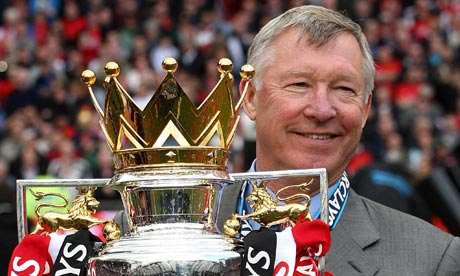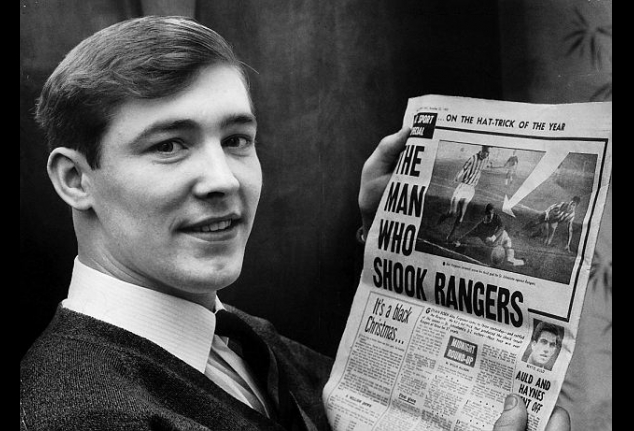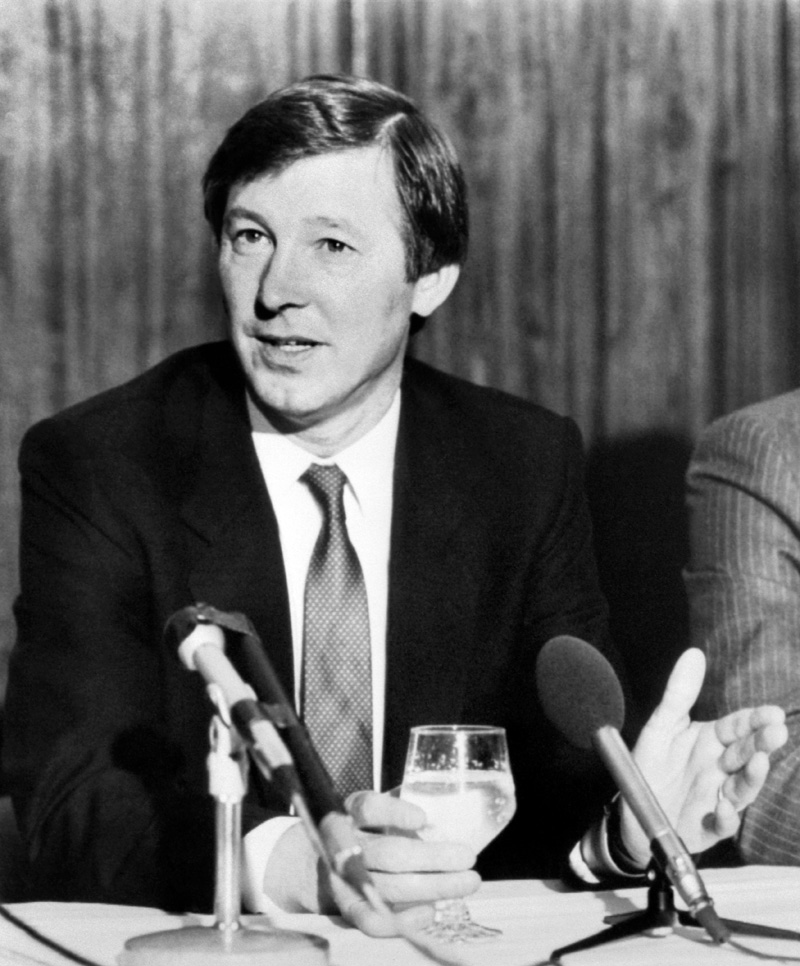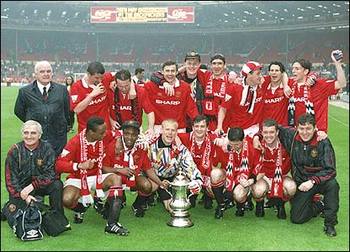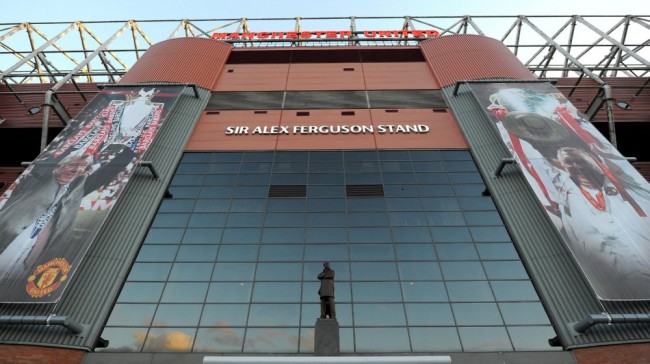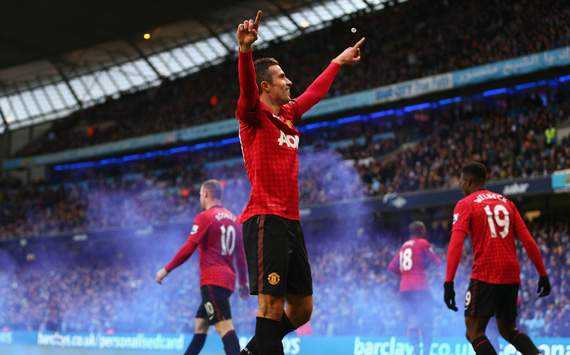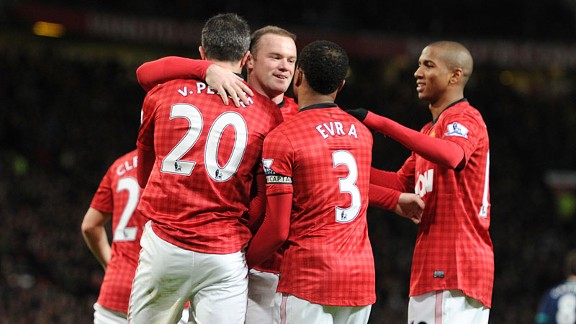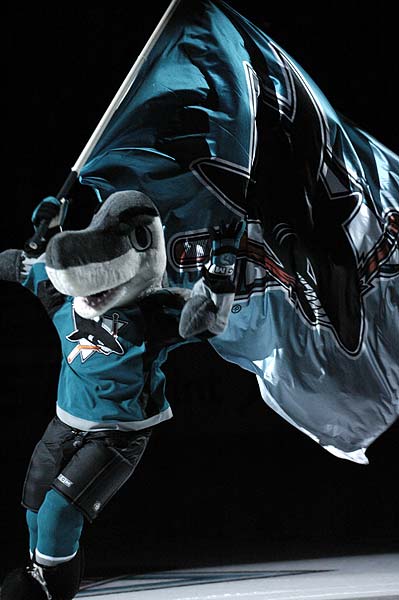Sir Alex Ferguson
The Greatest Legend
I decided to write a little brief history lesson on Sir Alex Ferguson, the greatest manager to ever walk the face of the earth. I will also do some theory crafting on when Fergie might leave the club and who could actually fill his shoes, if anyone.
Early Years
Alex Ferguson was born at his grandmother's home on 31 December 1941 to Alexander Beaton Ferguson, a plater's helper in the shipbuilding industry, and his wife, the former Elizabeth Hardie. He attended Broomloan Road Primary School and later Govan High School.
Alex Ferguson began his playing career at a small local club, Queen's Park F.C. Today, the club is currently the only amateur club in the Scottish League and at the young age of sixteen, Sir Alex Ferguson started his playing career there as a striker. In his first match playing for the club, Ferguson is quoted to saying that his first match was "a nightmare" even though he did manage to score in their 2-1 defeat to Stranraer.
Since Queen's Park F.C. was and is an amateur club, Alex also worked in the Clyde shipyards as an apprentice tool-worker, where he became an active trade union shop steward.
Perhaps his most notable game for Queen's Park was the 7–1 defeat away to Queen of the South in 1959, when Ivor Broadis, ex-England international, scored four of the Queen of the South goals. Ferguson scored the only goal of that game for his team.
Despite scoring 20 goals in his 31 games for Queen's Park, he was unable to maintain a starting first team position and moved to St. Johnstone in 1960. Although he continued to score regularly at St. Johnstone, he was still not getting starting positions for first team play and regularly requested transfers.
Ferguson was out of favor at the club and he even considered emigrating to Canada, however St. Johnstone's failure to sign a striker led the manager to select Ferguson for a match against Rangers, in which he scored a hat trick in a surprise victory.
Dunfermline signed him the following summer, and Ferguson became a full-time professional footballer.
Professional Player
During his first season, his team Dunfermline, were strong challengers for the Scottish League and reached the Scottish Cup Final. Due to a poor performance against his former club St. Johnstone, Ferguson was dropped for the final, in which his team lost the final 3–2 to Celtic. Following the Cup Final, Fergie's team then failed to win the League by one point.
The next season saw Ferguson notch up 45 goals in 51 games for Dunfermline. Along with Joe McBride of Celtic, he was the top goalscorer in the Scottish League with 31 goals.
He would later join Rangers, his boyhood club, for £65,000, then a record fee for a transfer between two Scottish clubs.
He was blamed for a goal that they conceded in the 1969 Scottish Cup Final, in a match in which he was designated to mark Celtic captain, Billy McNeill. After the match, he was subsequently forced to play for the club's junior side instead of for the first team. Ferguson, as told by his Brother, was so furious by this, he threw away the cup loser's medal, wanting nothing to do with it.
The following October, Nottingham Forest wanted to sign Ferguson, who was upset still by the way Ranger's were treating him, but his wife, Cathy Holding, was not keen on moving to England at that time so he went to Falkirk instead.
He was promoted to player-coach there, but when John Prentice became manager he removed Ferguson's coaching responsibilities. Ferguson responded by requesting a transfer and moved to Ayr United, where he finished his playing career in 1974.
The Beginnings of a Manager
In June 1974, following the ending of his player career, Alex Ferguson was appointed manager of East Stirlingshire, at the young age of 32. The club did not have a single goalkeeper at the time requiring the young Scot to get to work quickly in hopes of a successful season.
He gained a reputation as a disciplinarian, with club forward Bobby McCulley later saying he had "never been afraid of anyone before but Ferguson was a frightening bastard from the start."
After only a handful of months at East Stirlingshire, and being a head on the tables of most clubs, Sir Alex was invited to manage St. Mirren. Even though they were below East Stirlingshire, St. Mirren was a bigger club and although Ferguson felt a degree of loyalty towards East Stirlingshire, he decided to join St. Mirren after taking advice from Jock Stein.
Sir Alex Ferguson was manager of St. Mirren from 1974 until 1978, producing a remarkable transformation of a team in the lower half of the Scottish Second Division, which would draw in crowds of just over 1,000, to First Division champions in 1977.
He discovered talent like Billy Stark, Tony Fitzpatrick, Lex Richardson, Frank McGarvey, Bobby Reid and Peter Weir while playing superb attacking football. The league winning team of 1977 had a median age of 19, with their Captain being only 20 years old.
It would not last for Ferguson at St. Mirren though, as he was sacked from the club for breaching his contract with the club. An official report released in 1999, said the official reasoning behind the sacking of Ferguson was for various breaches of contract including unauthorized payments to players.
He was counter-accused of intimidating behavior towards his office secretary because he wanted players to get some expenses tax free. He didn't speak to her for six weeks, confiscated her keys and communicated only through a 17-year-old assistant. The tribunal concluded that Ferguson was "particularly petty" and "immature".
It was claimed during the tribunal by St. Mirren chairman, Willie Todd, that Ferguson had "no managerial ability".
On May 31st, 2008, The Guardian published an interview with Todd (then aged 87), who had sacked Ferguson all those years earlier. He explained that the fundamental reason for the dismissal was a breach of contract relating to Ferguson having agreed to join Aberdeen. Ferguson told journalist Jim Rodger of the Daily Mirror that he had asked at least one member of the squad to go to Aberdeen with him. He also told the St. Mirren staff he was leaving. Todd expressed regret over what happened but blamed Aberdeen for not approaching his club to discuss compensation.[Link]
Aberdeen
Sir Alex Ferguson joined Aberdeen as manager in June 1978, replacing Billy McNeill who had only managed the club for one season before he was offered the chance to manage Celtic. Although Aberdeen were one of Scotland's major clubs they had won the league only once, in 1955 under Dave Halliday. The team had been playing well, however, and had not lost a league match since the previous December, having finished second in the league the previous season.
Ferguson had now been a manager for four years, but was still not much older than some of the players and had trouble winning the respect of some of the older players on the team. The season did not go well, with Aberdeen reaching the semi-final of the Scottish Cup and the Scottish League Cup Final, but losing both matches and finishing fourth in the league.
When the 1980s came, Aberdeen had started the season poorly but their form improved dramatically during the new year and they won the Scottish league that season with a 5–0 win on the final day. It was the first time in fifteen years that the league had not been won by either Rangers or Celtic.
Ferguson now felt that he had the respect of his players, later saying "That was the achievement which united us. I finally had the players believing in me". He was still a strict disciplinarian, though, and his players nicknamed him Furious Fergie. He fined one of his players, John Hewitt, for overtaking him on a public road, and kicked a tea urn at the players at half time after a poor first half during a match.
He was dissatisfied with the atmosphere at Aberdeen matches, and deliberately created a 'siege mentality' by accusing the Scottish media of being biased towards the Glasgow clubs, in order to motivate the team. The team would continue their success with a Scottish Cup win in 1982.
Ferguson was offered the managers' job at Wolves but turned it down as he felt that Wolves were in trouble and his ambitions at Aberdeen were not even half fulfilled.
After the cup win in 1982, Ferguson led Aberdeen to even greater success in Europe. They had qualified for the European Cup Winners' Cup for the Scottish Cup they won the previous season, and impressively knocked out Bayern Munich, who had beaten Tottenham Hotspur 4–1 in the previous round.
After knocking Bayern Munich out, this gave the team the confidence to believe that they could go on to win the competition, which they did, with a 2–1 victory over Real Madrid in the final on the 11th of May, 1983.
Aberdeen became only the third Scottish team to win a European trophy and Ferguson now felt that had achieved something great with Aberdeen. They also performed well in the league that season, and retained the Scottish Cup with a 1–0 victory over Rangers.
Ferguson was not happy with his team's play in the Cup match and upset the players by describing their play as a "disgraceful performance" in a televised interview after the match, a statement he later retracted.
After a slow start to the 1983–84 season, Aberdeen's form improved and the team won the Scottish league and retained the Scottish Cup. Ferguson was appointed an Officer of the Order of the British Empire (OBE) in 1984. He was offered the managers' jobs at Rangers, Arsenal and Tottenham Hotspur during the season.
Aberdeen retained their league title in the 1984–85 season, but had a disappointing season in 1985–86, finishing fourth in the league, although they did win both domestic cups. Ferguson had been appointed to the club's board of directors early in 1986, but that April he told Dick Donald, their chairman, that he intended to leave that summer.
Following the sudden death of manager Jock Stein, who had collapsed and died on 10 September 1985 at the end of the game in which Scotland qualified from their group for a play-off against Australia.
Ferguson promptly agreed to take charge of the Scottish national side against the Australians and subsequently at the World Cup. Following their defeat in the group stages of the World Cup, Ferguson stepped down as national team manager on 15 June 1986.
During the summer following the World Cup, Alex Ferguson started to get many invites to manage big time clubs, including Rangers, Tottenham, Arsenal, Wolverhampton Wanderers. Ferguson was also being considered for the Liverpool manager's job after the retirement of Joe Fagan was announced, but the job was quickly accepted by Liverpool striker Kenny Dalglish.
Although Ferguson remained at Aberdeen over the summer, he did eventually join Manchester United when Atkinson was sacked in November 1986.
Manchester United
Stepping in for Atkinson in November, Manchester United were 21st in the league, and even though Alex Ferguson lost his first game against underdogs Oxford United on November 8th, losing 2-0 to them. Following that, seven days later United were held to a goalless draw at newly promoted Norwich City, and then Fergie got his first win at home against QPR on the 22nd of November, winning 1-0.
Results steadily improved as the season went on for Manchester United, and by the time they recorded what would be their only away win of the league campaign at title challengers and deadly rivals Liverpool, it was clear that United were on the road to recovery, finishing 11th in the middle of the table.
The next season really showed more to the fans of United how well Alex Ferguson was doing rebuilding the team, as he made several major signings, including Steve Bruce, Viv Anderson, Brian McClair and Jim Leighton.
The new players made a great contribution to a United team who finished in second place, nine points behind Liverpool. However, Liverpool's points lead had been in double digits for most of the season and while United had lost only five league games all season, they drew 12 games and there was clearly still some way to go before United could be a match for their league rivals.
During the next season of 88-89, Manchester United were expected to do well when Mark Hughes returned to the club two years after leaving for Barcelona, but United finished eleventh in the league and lost 1–0 at home to Nottingham Forest in the FA Cup Sixth Round.
They had begun the season slowly, going on a nine-match win-less run throughout October and November with one defeat and eight draws before a run of generally good results took them to third place and the fringes of the title challenge by mid February. However, another run of disappointing results in the final quarter of the season saw them fall down to mid table.
After the disappointing season, Ferguson further boosted his squad by paying large sums of money for midfielders Neil Webb, Mike Phelan and Paul Ince, as well as defender Gary Pallister and winger Danny Wallace.
The new season began well with a 4–1 win over defending champions Arsenal on the opening day, but United's league form quickly turned sour. In September, United suffered a humiliating 5–1 away defeat against fierce rivals Manchester City.
Following this and an early run of six defeats and two draws in eight games, a banner declaring "Three years of excuses and it's still crap...ta-ra Fergie." was displayed at Old Trafford, and many journalists and supporters called for Ferguson to be sacked.
Regardless of the fans and media's demands, the board of directors had assured Ferguson that they were not considering dismissing him. Although naturally disappointed with the lack of success in the league, they understood the reasons for the sub-standard results (namely the absence of several key players due to injury) and were pleased with the way that Ferguson had reorganized the club's coaching and scouting system.
Following a run of seven games without a win, Manchester United were drawn away to Nottingham Forest in the third round of the FA Cup. Forest were performing well that season and were in the process of winning the League Cup for the second season running, and it was expected that United would lose the match and Ferguson would consequently be sacked, but United won the game 1–0 thanks to a Mark Robins goal and eventually reached the final.
This cup win is often cited as the match that saved Ferguson's Old Trafford career, even though it has since been stated that his job was never at risk.
United went on to win the FA Cup, beating Crystal Palace 1–0 in the final replay after a 3–3 draw in the first match, giving Ferguson his first major trophy as Manchester United manager. United's defensive frailties in the first match were unilaterally blamed on goalkeeper Jim Leighton, forcing Ferguson to drop his former Aberdeen player and bring in Les Sealey.
During the 1990-91 season, Ferguson and United stepped up their game, working harder and looking overall way better, but they were still inconsistent and finished sixth.
There were some excellent performances that season, including a 6–2 demolition of Arsenal at Highbury, but results like an early 2–1 loss at newly promoted Sunderland, a 4–0 September hammering by Liverpool at Anfield, and a 2–0 home defeat by Everton in early March, also the first game 17 year old Ryan Giggs made his senior debut, showed that United still had some way to go.
During the 91-92 season, Ferguson made two major signings – goalkeeper Peter Schmeichel and defender Paul Parker – to bolster his side. There was much anticipation about the breakthrough of the young Ryan Giggs, who had played twice and scored once during the last season, and the earlier emergence of another impressive young winger in the shape of Lee Sharpe, who despite their youth had made Ferguson feel able to resist plunging into the transfer market and buying a new player to take over from the disappointing Danny Wallace on the left wing.
He had also added the Ukrainian Andrei Kanchelskis to the right wing, giving him a more attacking alternative to older right footed midfielders Mike Phelan and Bryan Robson.
Sadly though, the season did not live up to Ferguson's expectations and, in Ferguson's words, "many in the media felt that my mistakes had contributed to the misery". United won the League Cup and Super Cup for the first time, but lost out on the league title to rivals Leeds United after leading the table for much of the season.
A shortage of goals and being held to draws by teams they had been expected to beat in the second half of the campaign had proved to be the undoing of a United side who had performed so well in the first half of the season.
Before the start of the next season, 1992-1993, Ferguson went on the hunt for a new striker. He first attempted to sign Alan Shearer from Southampton, but lost out to Blackburn Rovers. He also made at least one approach for the Sheffield Wednesday striker David Hirst, but manager Trevor Francis rejected all offers and the player stayed put.
In the end, he paid £1 million for 23-year-old Cambridge United striker Dion Dublin – his only major signing of the summer.
Even with all of the hope, the season yet again started off slow for Manchester United, and it looked as though United would miss out on the league title yet again.
However, after the purchase of French striker Eric Cantona from Leeds United for £1.2 million, the future of Manchester United, and Ferguson's position as manager, began to look bright. Cantona formed a strong partnership with Mark Hughes and fired the club to the top of the table, ending United's 26-year wait for a League Championship, and also making them the first ever Premier League Champions.
United had finished champions with a 10-point margin over runners-up Aston Villa, whose 1–0 defeat at Oldham on 2 May 1993 had given United the title. Ferguson was voted Manager of the Year by the League Managers' Association.
The 1993–94 season brought even more success for Manchester United. Ferguson added Nottingham Forest's 22-year-old midfielder Roy Keane to the ranks for a British record fee of £3.75million as a long term replacement for Bryan Robson, who was nearing the end of his career.
United led the league for the entire season, winning easily as they marched on for another title. Cantona was top scorer with 25 goals in all competitions despite being sent off twice in the space of five days in March 1994.
United also reached the League Cup final but lost 3–1 to Aston Villa, managed by Ferguson's predecessor, Ron Atkinson. In the FA Cup final, Manchester United achieved an impressive 4–0 scoreline against Chelsea, winning Ferguson his second League and Cup Double.
The next season was a harder season for Ferguson.
Cantona assaulted a Crystal Palace supporter in a game at Selhurst Park, and it seemed likely he would leave English football. An eight month ban saw Cantona miss the final four months of the season. He also received a 14-day prison sentence for the offence but the sentence was quashed on appeal and replaced by a 120-hour community service order.
On the brighter side, United paid a British record fee of £7million for Newcastle's prolific striker Andy Cole, with young winger Keith Gillespie heading to the north-east in exchange. The season also saw the breakthrough of young players Gary Neville, Nicky Butt and Paul Scholes, who provided excellent cover for the long periods that United were left without some of their more experienced stars.
However, the championship slipped out of Manchester United's grasp as they drew 1–1 with West Ham United on the final day of the season, when a win would have given them the a third successive league title. United also lost the FA Cup final in a 1–0 defeat to Everton.
Ferguson was heavily criticized in the summer of 1995 when three of United's star players were allowed to leave and replacements were not bought. First Paul Ince moved to Internazionale of Italy for £7.5 million, long serving striker Mark Hughes was suddenly sold to Chelsea in a £1.5 million deal, and Andrei Kanchelskis was sold to Everton.
It was widely known that Ferguson felt that United had a number of young players who were ready to play in the first team. The youngsters, included Gary Neville, Phil Neville, David Beckham, Paul Scholes and Nicky Butt, who would all go on to be important members of the team. The season began for United without a major signing, at a time when the likes of Arsenal, Liverpool and Newcastle United were making the headlines with big money signings.
When United lost the first league match of the season 3–1 to Aston Villa, the media swooped upon Ferguson with undisguised glee. They wrote United off because Ferguson's squad contained so many young and inexperienced players.
Match of the Day pundit, Alan Hansen proclaimed that "you can't win anything with kids".
However, the young players performed well and United won their next five matches, exacting their revenge over Everton for the FA Cup defeat with a 3–2 win at Goodison Park and achieving a 2–1 away win over defending champions Blackburn Rovers who were now looking rather like relegation battlers than title contenders.
Cantona's return from suspension was a boost, but they found themselves 10 points behind Newcastle United by Christmas 1995. A 2–0 home win over the Tynesiders on the 27th of December, narrowed the gap to seven points and a subsequent win over struggling QPR narrowed it to four points, but a 4–1 defeat for United at Tottenham on New Year's Day and a 0–0 home draw with Aston Villa saw the Magpies re-establish their wide lead and it looked certain that the league title was Newcastle's.
However a series of good results starting in mid January saw the gap close, and when United traveled to Newcastle and won 1–0 on 4 March, the gap was down to a single point.
United went top of the league soon after the win at Newcastle, who continued to drop points in crucial games.
United's Premier League title success was confirmed on the final day of the season, when they defeated a Middlesbrough side managed by former United captain Bryan Robson in a game which ended in a 3–0 win despite strong displays by Boro confounding pre-match reports that Robson would give his old team an easy ride.
They played Liverpool in that year's FA Cup final, winning 1–0 with a late goal by Cantona. This made them the first team in English football to repeat the double of the league title and FA Cup, and more impressive was the fact that it had been achieved with a similar set of players to the ones who achieved the first double.
The next season saw Sir Alex Ferguson guide Manchester United to their fourth Premier League title in five seasons. At the end of the season, Cantona surprisingly retired from football.
The season also saw two Norwegian signings, striker Ole Gunnar Solskjær (the club's top scorer that season) and defender Ronny Johnsen, who were bargain buys as they were little known outside the Premier League on their arrival the previous summer but went on to be key factors in United's fourth Premier League title.
The 1998–99 season saw Manchester United winning an unprecedented treble of the Premier League title, FA Cup and Champions League. The season was characterized by highly dramatic matches.
In the Champions League semi-final second leg, United conceded two early goals away to Juventus; however, inspired by Roy Keane, who would later miss the final through suspension, United came back to beat Juventus 3–2, and reach their first European Cup final since 1968.
In the FA Cup semi-final, United faced close rivals Arsenal and appeared to be heading for defeat when Keane was sent off and Arsenal were awarded a last-minute penalty. Peter Schmeichel saved the penalty, and in extra time Ryan Giggs ran the length of the pitch to score perhaps the most memorable goal of his career to win the match.
They then defeated Newcastle United 2–0 in the FA Cup Final at the Wembley Stadium, thanks to goals from Teddy Sheringham and Paul Scholes.
The European triumph was the most incredible of all. With 90 minutes on the clock, they were 1–0 down to Bayern Munich at the Camp Nou in Barcelona, following a Mario Basler free kick, but in three minutes of injury time allowed by referee Pierluigi Collina, Teddy Sheringham, a substitute, equalised and extra time looked certain. But with just seconds left on the clock, Ole Gunnar Solskjær, also a late substitution, scored the winning goal and history was made.
On 12 June 1999, Ferguson received a knighthood in recognition of his services to the game.
Manchester United ended the 1999–2000 season as champions with just three Premier League defeats, and a cushion of 18 points. The massive gap between United and the rest of the Premier League, although they had faced stiff competition from the likes of Arsenal and Leeds United until the final weeks of the season, caused some to wonder if the club's financial dominance was developing into a problem for the English game.
In April 2000, it was announced that Manchester United had agreed to sign Dutch striker Ruud van Nistelrooy from PSV Eindhoven for a British record fee of £18million. But the move was put on hold when van Nistelrooy failed a medical, and he then returned to his homeland in a bid to regain fitness, only to suffer a serious knee injury which ruled him out for almost a year.
28-year-old French goalkeeper Fabien Barthez was signed from Monaco for £7.8million—making him the most expensive goalkeeper to be signed by a British club, and United won the title again, becoming only the fourth side in history to win the English league title three seasons in succession.
They also matched Liverpool's record (set in 1991) of 10 successive top two finishes.
However, the press largely saw the 1999–2000 and 2000–01 campaigns as failures as United had failed to win the European Cup, falling at the quarter final stages to Real Madrid in 2000 and Bayern Munich in 2001.
During the 2001 close season Ruud van Nistelrooy joined, and soon after Manchester United again broke the British transfer record—this time paying Lazio £28.1million for Argentine attacking midfielder Juan Sebastián Verón, although he failed to live up to the high expectations his transfer fee suggested and he was sold to Chelsea for £15million only two years later.
By 8 December 2001, after a terrible run of form which saw one win and six defeats on a period of seven league games, Manchester United were ninth in the Premier League — 11 points behind leaders Liverpool who had a game in hand. There were widespread fears that they might not even qualify for Europe, let alone win the league title.
Then came a dramatic turn around in form: between mid-December and late January, as eight successive wins saw Manchester United climb to the top of the Premier League and put their title challenge back on track. Despite this, United finished third in the League as rival Arsène Wenger clinched the title for Arsenal at Old Trafford with a 1–0 win in the penultimate game of the season after United dropped points in a couple of other crucial games during the run-in.
United were also unsuccessful in Europe, losing the Champions League semi-final on away goals to Bayer Leverkusen. Early exits from the League Cup and FA Cup meant that the season ended trophy-less As they were third in the league and had not reached a cup final, it was the first time since 1989 that they had finished a season without being winners or runners-up of a major competition.
The 2001–02 season was to have been Ferguson's last as Manchester United manager, and the looming date of his retirement was cited as a reason for the team's loss of form. Ferguson himself admitted that the decision to pre-announce his retirement had resulted in a negative effect on the players and on his ability to impose discipline.
But in February 2002 he agreed to stay in charge for at least another three years.
Manchester United won their eighth Premier League title yet just over two months before the end of the season they were eight points behind leaders Arsenal. But an improvement in form for United, and a decline for Arsenal, saw the Premier League trophy gradually slip out of the Londoners' grasp and push it back in the direction of Old Trafford.
Ferguson described the 2002–03 title triumph as his most satisfying ever, due to the nature of a remarkable comeback. The excellent run-in had produced 10 wins and a draw (including 4–0 home win over Liverpool and a 6–2 away demolition of Newcastle United) from the final 11 games, and no defeats since Boxing Day.
Not for the first time, Ferguson had proven to be a master of managerial mind-games, successfully rattling the composure of Arsenal and their otherwise unflappable manager Arsène Wenger.
Ferguson guided Manchester United to their eleventh FA Cup at the end of the 2003–04 season, but it was a disappointing season which had seen them finish third in the Premier League (which was won by an undefeated Arsenal side) and suffer Champions League elimination at the hands of eventual winners FC Porto.
At the beginning of the 2004–05 season, teenage striker Wayne Rooney and Argentine defender Gabriel Heinze joined United while Cristiano Ronaldo continued where he had left off the previous season by putting in more match-winning performances. But the lack of a striker after van Nistelrooy spent most of the season injured saw the club finish third for the third time in four seasons.
In the FA Cup they lost on penalties to Arsenal.
A second round exit from the European Cup at the hands of AC Milan and a semi-final exit from the League Cup at the hands of eventual winners Chelsea (who also clinched the Premier League title) meant that 2004–05 was a rare instance of a trophyless season for United.
The 05-06 season was one of transition. On 18 November, Roy Keane officially left the club, his contract ended by mutual consent.
United failed to qualify for the knock-out phase of the UEFA Champions' League.
In the January transfer window Serbian defender Nemanja Vidić and French full-back Patrice Evra were signed, and the side finished in second place in the league, behind runaway leaders Chelsea.
Winning the League Cup was a consolation prize for lack of success elsewhere. Ruud van Nistelrooy's future at Old Trafford seemed to be in doubt after not starting in the League Cup final, and he departed at the end of the season.
During the summer of 2006, Michael Carrick was captured to replace Roy Keane in the middle of the field to give United that extra power they needed. It paid off as Manchester United subsequently won their ninth Premier League title but sadly were denied a unique fourth double by Chelsea's Didier Drogba scoring a late goal in the FA Cup Final at Wembley.
For the 2007–08 season, Ferguson made notable signings to reinforce United's first team.
Long-term target Owen Hargreaves joined from Bayern Munich, bringing an end to a year of negotiations. Ferguson further bolstered the midfield with the additions of young Portuguese winger Nani and Brazilian playmaker Anderson. The last summer signing was of West Ham United and Argentina striker Carlos Tévez after a complex and protracted transfer saga.
United had their worst start to a season under Ferguson, drawing their first two league games before suffering a 1–0 defeat to local rivals Manchester City. However, United recovered and began a tight race with Arsenal for the title. After a good run of form, Ferguson claimed that throughout his time at Manchester United, this was the best squad he had managed to assemble thus far.
On the 11th of May, Ferguson led Manchester United to a tenth Premier League title, exactly 25 years to the day after he led Aberdeen to European glory against Real Madrid in the European Cup Winners' Cup.
Nearest rivals Chelsea – level on points going into the final round of matches, but with an inferior goal difference – could only draw 1–1 at home to Bolton, finishing two points adrift of the champions. United's title win was sealed with a 2–0 win over Wigan Athletic, managed by former United captain Steve Bruce, who before the game blew the whistle on suggestions that he would give his old club an easy ride – just as Bryan Robson had done 12 years earlier.
Following their Premier League win, on the 21st of May, Ferguson won his second European Cup with Manchester United as they beat Chelsea 6–5 on penalties in the Luzhniki Stadium in Moscow, following a 1–1 draw after extra time in the first ever all-English UEFA Champions League Final.
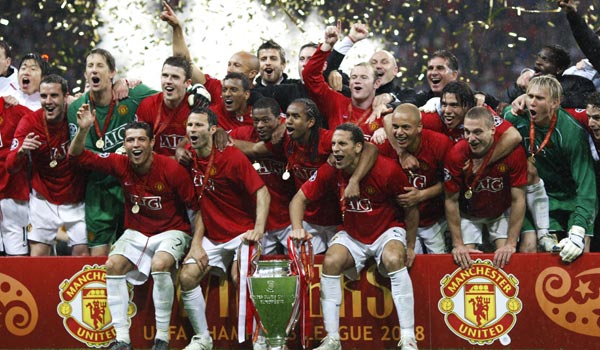
A penalty miss from Cristiano Ronaldo meant that John Terry's spot-kick would have given the trophy to Chelsea if successfully converted, but Terry blew his chance of glory and in the end it was Edwin van der Sar's blocking of a Nicolas Anelka penalty which gave the trophy to Manchester United for the second time under Ferguson and for the third time overall.
In 2008-09 season, Sir Alex Ferguson won the Premier League again, as well as the Football League Cup.
In the 2009-10 season, United won the Football League Cup, but wound up losing the Premier League title to Chelsea who won it on the last matchday.
In the 2010-2011 season, Ferguson brought home to Old Trafford the Community Shield and Manchester United's 19th Premier League, taking over top spot from Liverpool on most league championships.
The Future for Fergie
As we carry on during the current season, 2012-2013, we all have to wonder how much time is left for Sir Alex Ferguson and his managing career.
With so many wins, so many records broken and set, and Ferguson being 70 years old, surely he only has so much time left?
He has stated a handful of times he was going to retire at the end of different seasons, but then turns around and always comes back. I don't blame him at all, for one as a United fan I fear the day he steps down from being United's manager and I see no reason why he should yet.
I can see Ferguson managing for at least five more years if he so chooses to, and his health holds up, which he looks way more healthy than most 70 year olds.
I also believe, Ferguson has no real plans on retiring, for when he does he will be sitting around at home wondering what to do next. He is someone who is always chasing a goal, working hard towards it.
Why would he want to give up on managing the greatest football team on the world? Especially with our young players slowly gaining age to start playing on the first team, he could have a chance to repeat what he did during the 90's with his young squad of Scholes, Giggs, Beckham, Neville, etc.
It'll be a very dark day when Fergie decides enough is enough, so who would be our choices to replace him? Well, as we have no definitive window of time when he might leave, it's really up in the air. Some people that have been hinted are Pep Guardiola, ex-Barcelona manager who led them to many seasons of success, and Ole Gunnar Solskjaer, who has recently started winning as a manager for Molde, winning back to back titles.
There are many more choices, and maybe even some we do not know about right now, but one thing is for sure.
It's still Fergie's Time.

A lot of this information comes from Sir Alex Ferguson's different books that he has written or someone else has. If you need exact citations, feel free to message me.

